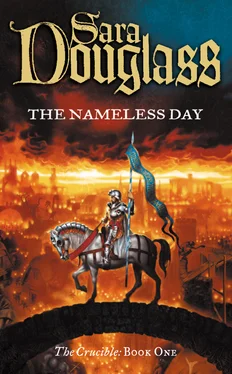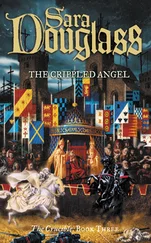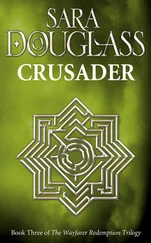Bertrand nodded. “We break our fast after Prime prayers, Brother Thomas. You may speak with me then. Do you wish Daniel to show you your cell now?”
“I thank you,” Thomas said, “but Daniel has already pointed out its location to me, and there is something else I wish to do before I retire.”
“Yes?”
Thomas took a deep breath, and from the expression on his face Bertrand suddenly realised that it was piety that had impelled Thomas to take holy orders.
“I would pray before the altar of Saint Peter’s, Brother Prior. To prostrate myself to God’s will before the bones of the great Apostle has always been one of my dearest desires.”
“Then for the Virgin’s sake, brother, let Arno see to your feet before you go. I’ll not have the pope say that it was one of my brothers who left blood smeared all over the sacred floor of Saint Peter’s!”
After the celebrations of the day, Rome had darkened and quieted, and the streets were deserted. Thomas walked from the friary over the bridge crossing the Tiber—more comfortably now that Arno had daubed herbs on his ice-bitten feet, and wrapped them in thick, soft bandages inside his sandals—then halted on the far side, staring at the huge rounded shape of the Castel St Angelo from which the friary took its name. Thomas had heard that it was once the tomb of one of the great pagan Roman emperors, but the archangel Michael had appeared one day on its roof and from then on the monument had been converted to a more holy and Christian purpose: a fort, guarding the entrance to the domain of the popes in Rome, the Leonine City.
Thomas turned his head and stared west towards St Peter’s Basilica built into the hill of the Leonine City, and surrounded by lesser buildings and palaces housing, once again, the papal curia and the person of the Holy Father himself. Lights glinted in many of the windows in the papal palace, but even the excitement of a once-again resident pope could not diminish Thomas’ wonder at seeing the great structure of St Peter’s Basilica rising into the night.
Thomas’ eyes flickered once more to the Castel St Angelo. Legend had it that a long-dead pope had caused a tunnel to be built from the papal palace next to St Peter’s into the basements of the fort; an escape route into a well-fortified hidey-hole, should the Roman mobs ever get too unruly. Given the widespread reputation of the Romans for spontaneous and catastrophic violence, Thomas wondered if the first chore Gregory had undertaken once ensconced in his apartments was to personally dust away the spider webs and rats’ nests from the tunnel entrance.
Thomas grinned at the thought, then automatically—and silently—castigated himself for such irreverence. He looked at the gate in the wall of the Leonine City. It was closed, but several guards were on duty, and Thomas hoped they’d let him through.
They did. A single Dominican could harm no one, and Thomas’ obvious piety and insistence that he be allowed to pray before St Peter’s shrine impressed them as much as it had Bertrand.
The pressing of a coin into each of their hands dispelled any lingering doubts.
Beyond the gate Thomas walked slowly up the street leading to St Peter’s.
The Basilica was massive. Since the Emperor Constantine had first erected the Basilica in the fourth century, it had been added to, renovated, restored and enlarged, but it was still one of the most sacred sites for any Christian: the monument erected over the tomb of St Peter, first among Christ’s Apostles. Here pilgrims flocked in their tens of thousands every year. Here the penitent begged for their salvation. Here kings and emperors crawled on hands and knees begging forgiveness for their sins.
Here was the heart of functional Christendom now that Jerusalem was lost to the infidels.
Thomas faltered to a halt some hundred paces from the atrium leading to the Basilica, and his eyes filled with tears. For so long he had wanted to worship at St Peter’s shrine. Initially as a child, having watched his beloved parents die from the corruption of a return of the great pestilence; through all the years of his youth—years wasted in blasphemy and anger—and finally, to this man grown into the realisation that his life must be dedicated to God and furthering God’s mission here on earth.
It had been a long, difficult, fraught journey, but here he was at last.
At last.
Thomas resumed his slow walk towards the Basilica. At the end of the street thirty-five wide steps rose towards a marble platform before an irregular huddle of buildings: several huge archways, a tower, and tall brick apartments with colonnaded balconies. These buildings formed a wall to either side of the entrance archways into the vast court that served as the atrium of St Peter’s.
After an instant’s hesitation, Thomas climbed the steps and crossed the platform. Immediately before him were the three archways, the paved atrium stretching beyond them.
Normally, Thomas knew, it would have been full of stalls and traders selling pilgrim badges, relics, genuine holy water, splinters from the true cross and threads from Christ’s robe, but tonight the stalls were empty, their canvas roofs flapping in the breeze. For this day, at least, the pope had ordered the Leonine City emptied of traders, street merchants and hawkers.
The court was even empty of pilgrims, and Thomas’ spirits rose. He would have St Peter’s to himself.
As he approached the entrance into the Basilica he prayed that the pope had retired to his private apartments.
Thomas did not want to share St Peter’s shrine even with the Holy Father himself.
His heart thudding, Thomas entered the building.
It was massive, but what caught Thomas’ eye was its layout, used as he was to western churches constructed in the form of a cross. Constantine had built the Basilica in a roughly rectangular form, modelling it on the Roman halls of justice. The very eastern wall, where stood the altar over St Peter’s tomb, was rounded, but the rest of the Basilica was laid out as an immense hall with four rows of columns supporting the soaring timber roof and dividing the interior into a nave with two aisles to each side.
For long minutes Thomas could not move. His lips moved slowly in prayer, but his mind could not concentrate on the words. His eyes, round and wondrous, roamed the length and height of the Basilica, stopping now and then at a particularly colourful banner or screen, or lingering on the statue of a beloved saint.
Finally, he stared at the altar at the western end of the nave. Even from this distance he could see the exotic twisted columns guarding the altar, covered with a canopy hanging from four of the columns.
Thomas raised a hand, crossed himself, then slowly, and with the utmost reverence, walked down the length of the nave towards the altar. There were a few worshippers within the Basilica kneeling before some of the side shrines, and barely visible in the flickering light of the oil lamps, but there was no one before the altar itself.
Tears slipped down Thomas’ cheeks, and his hand grasped the small cross he wore suspended from his neck.
He had walked all his life towards this moment, and he could now hardly believe such was the munificence of God’s Grace that he was finally here.
Again Thomas’ steps faltered as he reached the altar. He knew that to one side steps led down into a chamber from where he could view through a grille the actual tomb of St Peter, but for now all Thomas wanted to do, all he could do, was to prostrate himself before the altar.
He slumped to his knees, his eyes still raised to the altar, then he dropped his head and hands, and lowered himself until he lay prostrate in a cruciform position before the altar.
It was cold and horribly uncomfortable, but Thomas was filled with such zeal he did not notice.
Читать дальше












